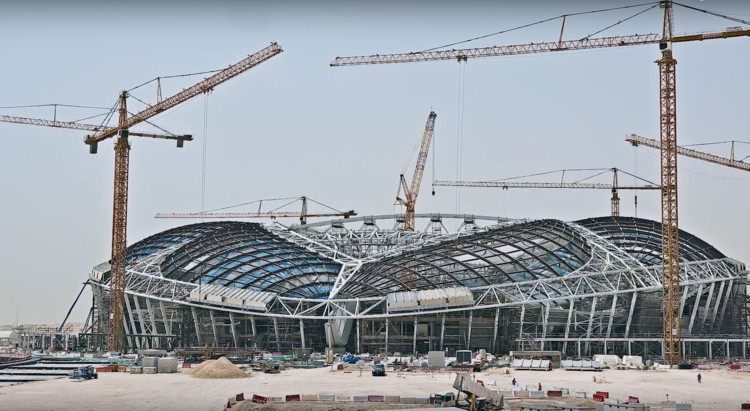On November 21, the 2022 FIFA World Cup will start in Qatar. This World Cup will be the first to be held in a Middle Eastern country and the last to be played under the current format. In addition, it will probably be the last one played by big stars like Karim Benzema, Lionel Messi and Cristiano Ronaldo.
The allocation of the World Cup venue to a country without a football tradition such as Qatar, has shown a series of non-sports interests and has generated great controversy around FIFA: the world governing body of football that, as such, should guarantee that its operations are socially responsible.
That has not been the tone of the preparations for the great sporting event in Qatar. On the contrary, everything indicates that the only important thing for FIFA and its sponsors is that the ball rolls again, starting on November 21.
Labor conditions
According to The Guardian newspaper, since 2010, when it was chosen to host the 2022 World Cup, Qatar has embarked on an unprecedented construction program. In addition to seven new stadiums and dozens of new projects, construction began on a new airport, highways, public transportation systems, hotels, and even a new city.
To achieve its ambitious goals, the organization has relied on migrant labor that works tirelessly, under subhuman conditions and non-existent labor rights. According to the human rights organization Amnesty International, the workers on these projects come mostly from Bangladesh, Nepal, India and Pakistan.
According to this organization, workers must pay high hiring commissions, which range between $500 and $4,300. As they have very few opportunities in their country of origin, many of them resort to debts that allow them to pay these commissions and work in Qatar.
Presumably, some workers have been victims of deception. For example, in their country of origin they are offered an amount of money, but when they arrive in Qatar they receive a payment of a third of the amount offered. As if this was not enough, the wages arrive late, if at all, and the workers are so unprotected that the possibility of claiming is non-existent.
Once installed in Qatar, the working conditions are deplorable. According to Amnesty International, the workers are stripped of their passports when they arrive on Qatari soil. This implies that they cannot leave the country or change jobs. In addition, they are obliged to remain in their camps, since not having an identification document can be fined or even imprisoned.
Workers are subjected to unhealthy camps, work days without rest, limited access to drinking water and temperatures of up to 50 degrees Celsius, among other calamities. All of the above, even if it is disguised as work by the FIFA authorities, simply means slavery.
Paper Policies
In addition to all these problems, health and safety conditions at work seem to be non-existent in Qatar. According to The Guardian, around 6,500 migrant workers have died during the organization of this World Cup. This represents around 12 weekly deaths since Qatar was designated as the venue and suggests that in November we will celebrate a planetary event that deserves to bear the sad name of the Cup of death.
If we want to put these data into perspective, we could consider that around 3,000 people died in the attack on the Twin Towers in New York, while the war in Ukraine has killed approximately 5,000 people. This means that the works related to the World Cup in Qatar have killed more people than any of these events. However, these deaths have been made invisible.
Recently, the CEO of Qatar 2022, Nasser Al-Kather, stated in an interview that only three people had died as a result of the construction of the World Cup. However, according to The Guardian, most of the deceased were in Qatar for the sole reason that the World Cup will be hosted there. The most ironic thing about this case is that, on its website, FIFA has a Human Rights and Non-Discrimination Policy. In this document, it undertakes to respect internationally recognized human rights and to promote the protection of those rights.
The policy in question is not only displayed on the FIFA website, but is also widely used in banners, advertisements and shirts worn by top players before matches. Obviously their slogans work as a marketing strategy and not as part of the corporate philosophy.
The questions towards FIFA are not new. In 2014, “The dirty side of football” was published, a book that pointed out a wide network of corruption, money laundering, tax evasion and other crimes around the so-called most beautiful sport in the world. The sad thing is that, nowadays, thousands of deaths should also be added to that list. The well-remembered phrase by Diego Armando Maradona from about two decades ago applies well: “the ball does not stain.”
The development of a World Cup is, without a doubt, an investment that generates economic benefits for all those involved. As such, it is necessary to apply different criteria of sustainability and governance, which ensure compliance with basic conditions. Sponsors play a critical role in this. All the companies that sponsor this World Cup are complicit in the violation of human rights that has taken place in Qatar. Until companies begin to take into account factors other than economical, these problems are bound to repeat themselves in any type of investment project.

